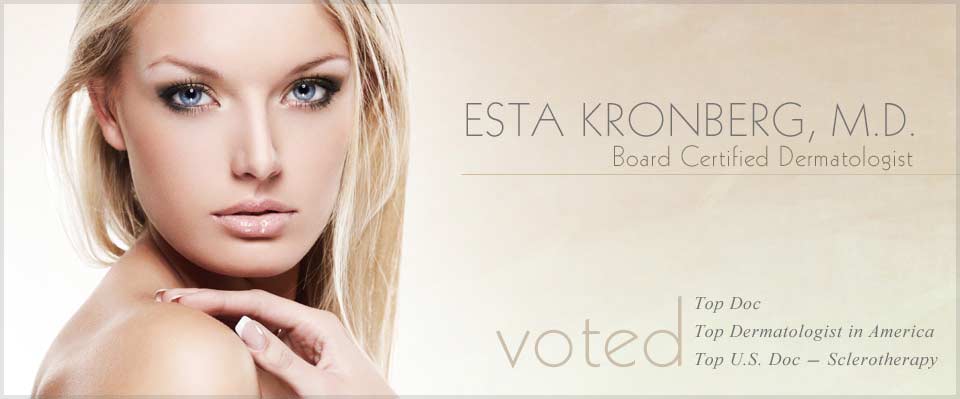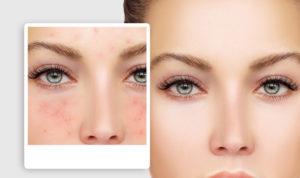What is Rosacea?
Rosacea is a chronic skin condition that primarily occurs on the central face. The treatable condition is characterized by occasional flare-ups and times of remission. Although it may occur at any age, statistics suggest that it most often develops after age 30. Scientists have yet to discover an exact cause of rosacea. However, they do believe that there is immune system involvement coupled with neurovascular dysregulation. These factors combine to trigger an inflammatory response that leads to redness and other symptoms. Two genetic variants have also been associated with the disorder, though more studies are necessary to better understand this condition. Finally, studies have found that a type of mite, which exist on everyone’s skin, are more abundant on the skin of people with rosacea.
How to Diagnose Rosacea
Rosacea is often diagnosed from a comprehensive health history and review of symptoms. Tests may be ordered to rule out other conditions that may mimic the symptoms of rosacea.
Symptoms of Rosacea
There are several diagnostic signs of with the most common being persistent redness and skin thickening. Additional symptoms include:
- Flushing, which includes a burning or warming sensation, usually across the cheeks.
- Pimples and bumps that resemble acne. These may be accompanied by burning or stinging.
- Visible blood vessels called telangiectasia on the bridge of the nose and the cheeks.
- Eye irritation including bloodshot, watery eyes.
- Dryness and rough skin texture on the central face.
- Slight swelling or raised, red patches of skin.
What Triggers Flare-ups?
Trigger identification is one of the major aspects of managing the chronic nature of rosacea. Every person is different in what triggers their flare-ups. Some of the common instigators include:
- Heat
- Stress
- Sunlight
- Cold and wind
- Alcohol (especially red wine)
- Exercise
- Spicy foods
- Certain medicines or skin or hair care product
How to Manage Your Symptoms
Being a chronic condition, rosacea needs continual maintenance. Patients are often advised to find and avoid their triggers as a primary way of managing flushing and other symptoms. To do this, it may be necessary to keep a diary that outlines exposure to foods and other elements and how the skin responds to then.
Skin care is also an important aspect of managing rosacea. Patients benefit from gentle skincare products that contain mild, nonabrasive ingredients. When washing the face, gentle motions should be used. The skin should be patted dry, not rubbed. Sunscreen is also a vital aspect of preventing flare-ups.
Is Rosacea Related to Other Skin Issues?
Rosacea is not caused by other skin issues, though it can be mistaken for acne and other conditions. These include seborrheic dermatitis, acne, and lupus. Certain diagnostic tests may be conducted to rule out systemic or autoimmune disease when evaluating the symptoms.
How Long Does Rosacea Last?
Rosacea is a chronic disorder, which means it never disappears entirely. It is marked by remissions and relapses, or flare-ups. Symptoms may last for a few weeks or a few months at a time. However, studies indicate that patients who continue therapy and lifestyle management techniques tend to encounter flare-ups less frequently over time. Healthy lifestyle choices, the avoidance of excessive sun exposure, and Soolantra may combine to achieve significant results in the management of rosacea.
Soolantra Cream is Easy on the Skin, but Tough on Rosacea
Researchers have developed a once-a-day cream to help decrease the frequency and severity of rosacea flare-ups. This cream, Soolantra, contains the medication ivermectin. Ivermectin has anti-inflammatory and anti-parasitic properties. It is these properties that may be responsible for clinical results including:
- 27% improvement in blemishes and bumps within 2 weeks of new use.
- Up to 75% improvement in blemishes and bumps by week 12 of use.
- Thirty-eight percent of patients reported nearly clear or clear skin at week 12.
- Over one year, study participants reported continued symptom improvement.
- Better response and fewer side effects than metronidazole 0.75% cream in a 16-week study.
Read what our patients are saying!
Dr. Zhang change my life . I was suffering with some sort of scalp condition where my hair was falling and could not stop scratching my head went to see doctors with out results but she knew what was going on from day one, she solve my problem and I am the happiest person again . she heard me and look at my condition and answered my questions. I recommended her 100%.
Click here to read more reviews.
Schedule a Consultation
Rosacea is not a condition to address without the help of an experienced, board-certified dermatologist. Dr. Kronberg have provided friendly, professional care to patients in Houston for the past 20 years. To get help with the symptoms of rosacea, call 713-771-8941 or 713-988-8442 and schedule a consultation and full dermatologic examination.





